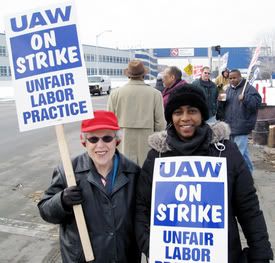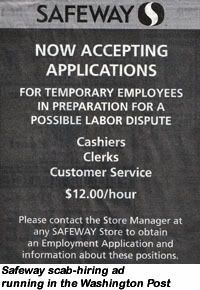It is no secret that AAM and the UAW are at odds with the new contract. It is no secret that the rumors, of the proposed contracts, are going to hurt thousands of families. And, it is no secret that we, as AAM families, simply can’t stand for it.
AAM states the
Processes are not clarified. Like re-run steel; steel is scrapped after it is run through the induction heater twice. No documentation supports this action. The Quality Supervisor states steel can be run through more than twice. Usually this steel is scrapped. Many racks of this steel are scrapped annually. How much money is lost on a whole rack of good steel being tossed out.
We had a period of time where no Preventative Maintenance had been performed on the Upsetters for many years. Employee’s are blamed for these machines not running or when we can’t obtain a quality part.
Supervisors just want to be a boss. It’s all about clicking with the Upper Management and covering their own rears not the hourly employees. Supervisors just want to look good for Dauch and Upper Management. We have been told, on Numerous occasions, when Dauch walks through the plants, to just keep the machines running even if we are only making scrap. They think they are showing Dauch that we are “running strong”. Dauch needs to walk in Unannounced. He will see the real way his plant is being run. It is like a dog and pony show if they know he is coming through.
Shotblast and Bender Operators become supervisors. An Agricultural Engineer running the Upset Department? Finance people become Area Supervisors and then Plant Managers? How can a 3 month Supervisor tell a 14 year vet what to do and how he should do it? Who would you want to teach you on the workings of an Upsetter; Management with a degree that has nothing to do with Manufacturing or an employee that has been running and repairing that machine for 14 years? These people have no idea the skillfulness and intricate modifications that are done to produce a quality part. Some of these modifications are needed due to the lack of preventive maintenance mentioned above.
There has been “big money” wasted on past processes that we don’t use anymore. Example: We implemented a new tagging system that failed TWICE. How many hours were wasted organizing and building this system, TWICE? How much in materials wasted, TWICE? By the way, we aren’t using this system …again. Yet, you won’t listen to the suggestions that will really save you money. Like the scrap mentioned above, or cutting small rubber mats out of the big used rubber mats to save money. Why buy small ones when we can reuse big ones? How many thousands of dollars would that have saved over the years? Somehow Management doesn’t think it’s a good idea! Who makes these decisions? I want to see them on St. Aubin begging for their jobs. These are some of the reasons why we feel we are being set up for failure. Imagine the money saved if someone listened to us years ago. Really, years ago.
AAM spent $150,000 to develop a class that would train and instruct us on how to run and repair an Upsetter. 4 people took the course (I was one of them) and there were numerous errors in the textbook and on the video. This is a training video and there is a safety violation RIGHT ON THE VIDEO! It is a shame that an hourly worker is looked at as disposable and useless. It is ironic that the same employee is the one who is correcting your textbook and has to educate the “teacher” on the finer points of Forging.
We have gone for years without the proper tools. At one time we had them. Then Management took them and threw them away because they were going to “re-do” the system. We have never received replacement tools. This causes much more down time and consequently money is wasted…again.
As we all know,
Then there are safety issues. There is plexiglass in the windows of an overhead crane. OSHA standards require shatterproof glass. Maybe I should mention the Upset crane that doesn’t have brakes. The list can really go on and on. Safety issues are ignored until we are fined or somebody gets hurt. 2 ½ years it took to put a mirror inside the bay door of the Upset department so Hi-lo’s won’t injure people.
These are just some of the issues in my department. I know there are issues in other departments as well and those employee’s could share a wealth of suggestions too.
While Mr. Dauch, was at Chrysler, he was quoted as saying “We would go in, stop operations, and talk to people” You felt it was important to hear what the workers had to say. Why not now when it is YOUR OWN company? Who better to give you insight on the struggles or successes on the floor? It has been said that you are purposely ignoring these issues because you want the Forge to fail. We know you want to shut it down. And who better to blame than the hourly employees that manufacture these products. I don’t want to believe that. Who in their right mind would want any part of their company to purposely fail? But how can such a shrewd businessman let all of this go on under his nose and be none the wiser?
I don’t need to quote all AAM and Dauch’s profits,. We have heard it many times. We all know about his large salary, bonuses etc while the company lost 222 million dollars in 2006. We are all aware of the bonuses of Upper Management. But not one of them are willing to take a cut. Do you even consider the consequences your actions are going to have on our families? 3600+ people will lose their homes and maybe even their cars. Some of your employees have spouses or other family members here too. So, in their case you are affecting two salaries in one household. In our situation, my wife has already taken a pay cut similar to the one we have heard you suggest. We simply can’t do it again. I am a forth generation Forge employee. I have worked for your company for 14 years. We have built a life around AAM and our pay. You can’t just take 60% of our pay and benefits and not expect a fight. What is left after I pay benefits with $11.40 an hr? How can I support my family with that? How would you support your family with that? With gas going to $4.00 a gallon, how can I even drive to work on that?
If you cut our wages the way you want to, you will have to offer a lump sum “buy out” or “buy down”. I hear you don’t want to do that. This almost seems impossible to believe. Are you so callous as to leave all these families bankrupt and homeless? I know it sounds extreme but it is very true.
I must quote Dauch again. In an article, from Krannert School of Management, Dick Dauch stated: (referring to a story that he reads to his employees “every year”)
“Have a Love Affair
You say you love me, but sometimes you don't show it.
In the beginning, you could not do enough for me.
Now you seem to take me for granted.
Some days I wonder if I mean anything to you at all.
Maybe when I'm gone you'll appreciate me and the things I do for you.
I'm responsible for getting food on your table; for the clean shirt you wear; for the welfare of your home; for the thousand-and-one things you want and need.
Why, if it weren't for me, you wouldn't have the car you drive.
I've kept quiet and waited to see how long it would take for you to realize how much you really need me.
Cherish me ... take good care of me ... and I'll take good care of you.
Who am I? I'm your JOB!”
What happened to those thoughts? And in the same article, when speaking of your contribution to our local communities, you stated “ …we do have a social conscience.” Where is it? It is going to be my kids you are helping out, in the Girls and Boys club of
With all this said; I have to say I know you have a negative opinion of the hourly worker. You feel that we are all replaceable and dispensable. I can assure you I am not. I am that worker who gives 110%. I go over and beyond. My Supervisors never have to tell me what to do because it is already done. I am never someone who says “that isn’t my job”. I can run and problem solve an Upsetter better than most people on the floor and any Manager that has come through this plant in my 14 yrs. I gave you 14 years of dedicated service and I deserve the respect as such.
In Solidarity



